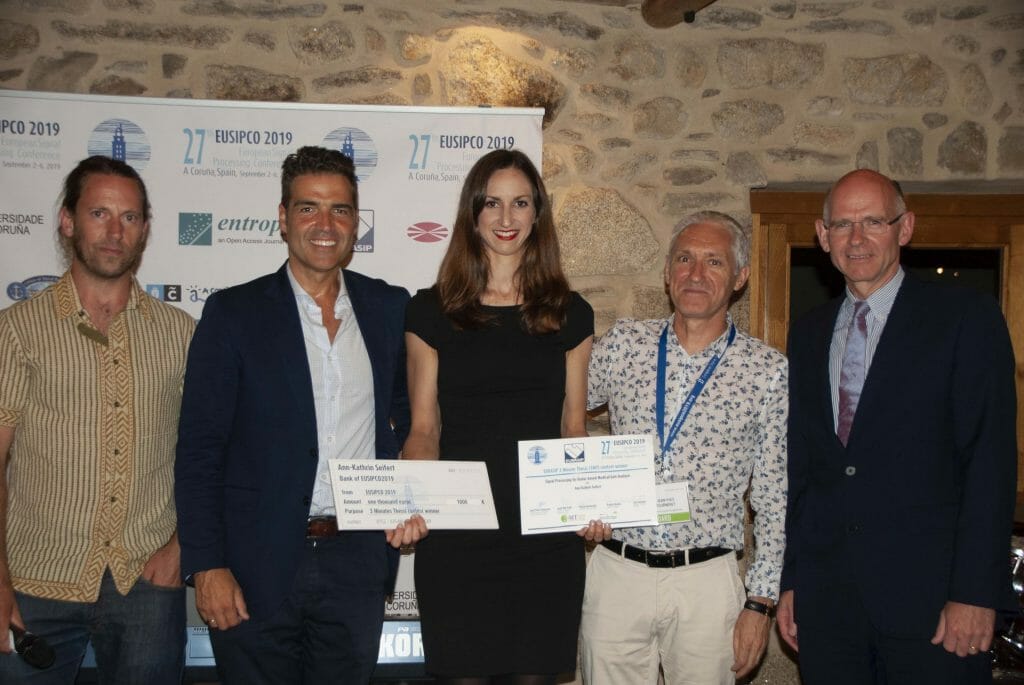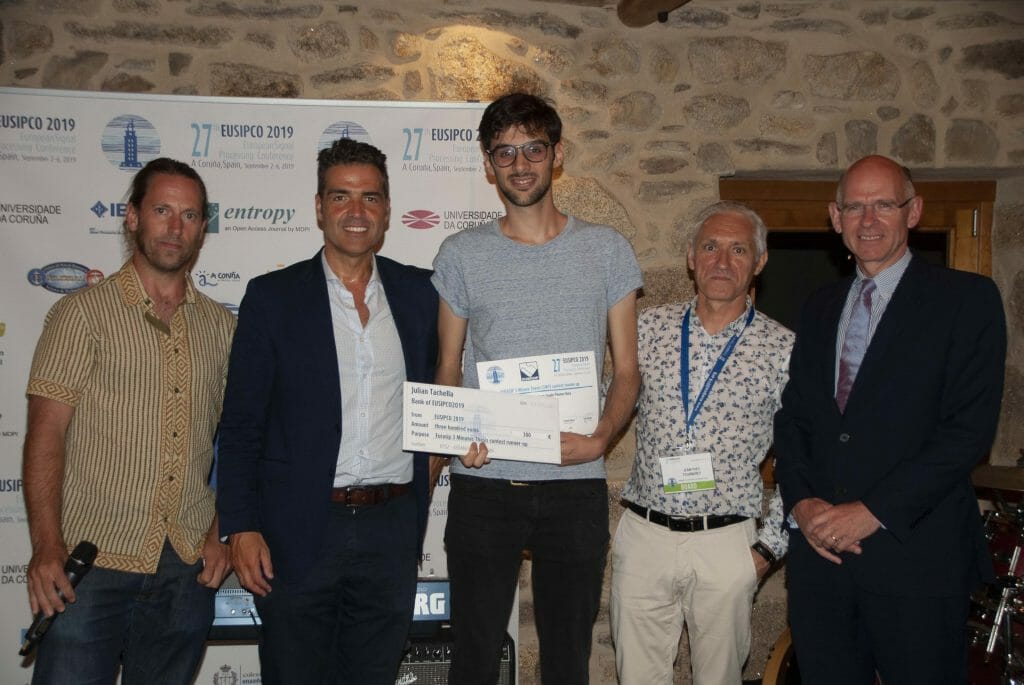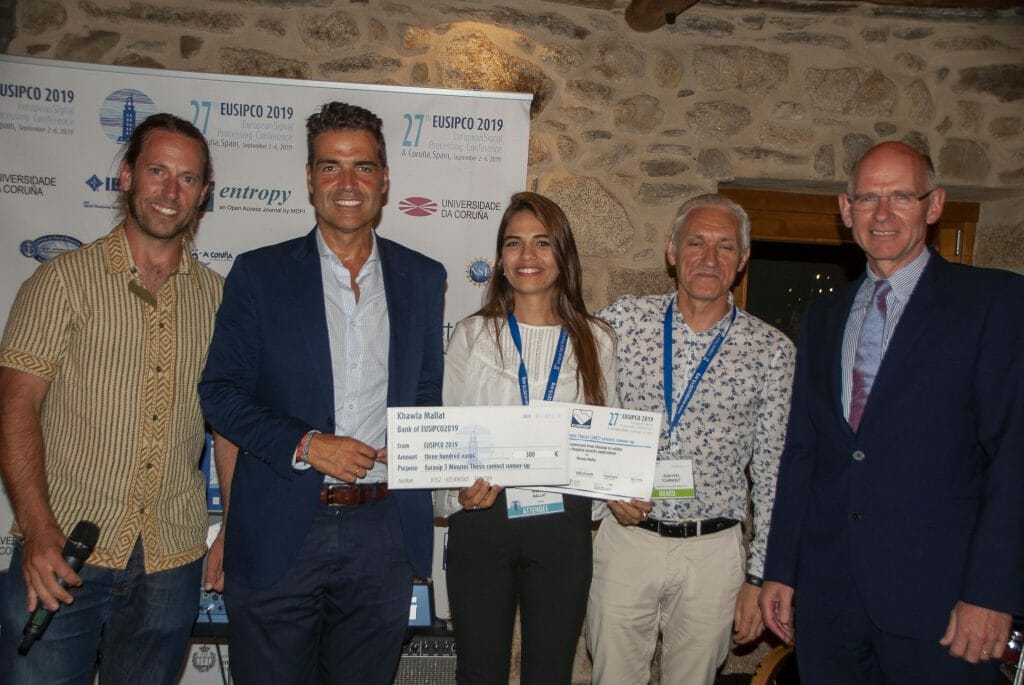3MT Contest
Initialized at EUSIPCO 2015 in Nice, EURASIP organizes each year a 3MT-Three Minute Thesis contest.
Top listed candidates are invited to give a 3-minute presentation on their PhD research during the annual EUSIPCO conference.
3MT is an exercise for students to consolidate their ideas so they can present them concisely to an audience specialized in different signal processing fields. Together with scientific and technical quality, EURASIP wants to promote transversal skills of young researchers such as oral presentation skills. An additional aim is to help those researchers to gain visibility of their work.
About 3MT®
“Three Minute Thesis (3MT®) is a research communication competition developed by The University of Queensland (UQ) which challenges research higher degree students to present a compelling oration on their thesis and its significance in just three minutes in language appropriate to a non-specialist audience.
3MT is not an exercise in trivialising or ‘dumbing-down’ research but forces students to consolidate their ideas and crystallise their research discoveries.”
History
The first 3MT was held at UQ in 2008 with 160 PhD students competing. In 2009 and 2010 the 3MT competition was promoted to other Australian
and New Zealand universities and enthusiasm for the concept grew. Due to its adoption in numerous universities, a multi-national event was developed, and the Inaugural Trans-Tasman 3MT competition was held at UQ in 2010.
Since 2011 the popularity of the competition has increased and 3MT competitions are now held in at least 170 universities across more than 17 countries worldwide.
In November 2013, the first Universitas 21 (U21) 3MT competition was held with several universities from around the world competing in a virtual competition.
Rules for Competition
The 3MT EUSIPCO competition will be performed according to the following basic rules:
- Eligibility: any PhD student
- The competition will be announced in both EUSIPCO and EURASIP web pages.
- Every participant is required to submit a video of 3 minutes and 1 page summary of his PhD, following the same template downloadable on the website of the EUSIPCO conference.
- Out of all the submissions a maximum of 10 finalists will be invited to present during EUSIPCO. The selection of the finalists will be carried out by the 3MT Committee.
- The finalists will receive complimentary registration to attend EUSIPCO (please note that such free registration cannot be used to cover accepted papers).
- Acceptance of participation will be based on the submitted video, completing the registration and attendance confirmation.
- The final contest will take place during EUSIPCO. The video of the winners will be posted on EURASIP video channel.
- Video submission requirements: all the video formats are accepted. The name of the video file should have the same name of the participant and should not exceed 3 minutes of duration.
- A single static PowerPoint slide is permitted. No slide transitions, animations or ‘movement’ of any description are allowed. The slide is to be presented from the beginning of the oration.
- No additional electronic media (e.g. sound and video files) are permitted.
- No additional props (e.g. costumes, musical instruments, laboratory equipment) are permitted.
- Presentations are limited to 3 minutes maximum and competitors exceeding 3 minutes are disqualified.
- Presentations are to be spoken word (e.g. no poems, raps or songs).
- Presentations are to commence from the stage.
- Presentations are considered to have commenced when a presenter starts their presentation through either movement or speech.
- The decision of the adjudicating panel is final.
Prize
The audience of the contest will select a “People’s Choice Award”, and assist the jury in selecting the winner and runner-up winner of the 3MT thesis competition. The winner and the recipient of the “People’s Choice Award” will be awarded with a prize of 500€ each. Candidates ranking second and third will receive an award certificate.
Contact
2023
Laëtitia Launet
Deep Learning Methodologies for Spitzoid Melanocytic Tumors Characterization
Martin Gölz
Spatial Inference via Multiple Hypothesis Testing
Nelida Mirabet
Social media filters: Beautification for humans but critical issue for AI
2022
Davide Salvi
A multimodal approach to face multimedia forensics challenges
2021
Eva Gil San Antonio
Intelligent Storage Into Synthetic DNA for Archiving Digital Images and Videos
Zuzana Jelcicova
Embedded Neural Networks in Resource-Constrained Hearing Instruments
2020
Qiongxiu Li
Privacy-Preserving Distributed Signal Processing
Oumaima El Mansouri
The fusion of MRI and US images for endometriosis detection
2019
Ann-Kathrin Seifert
Signal Processing for Radar-based
Medical Gait Analysis

Julian Tachella
3D Reconstruction from
Single-Photon Data

Khawla Mallat
Spectrum conversion from thermal to visible images: Imaging security applications

2015 & 2016
Karam Naser
Perceptual Compression of Dynamic Textures
Maryam Najafian
Accent robust speech recognition
Sahar Khawatmi
Over Multi-task Networks
